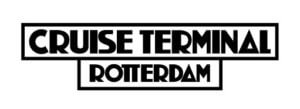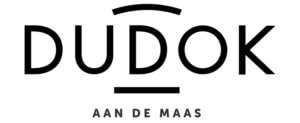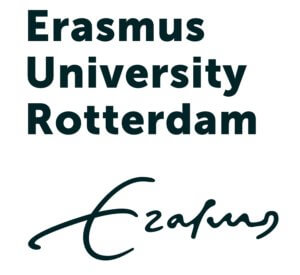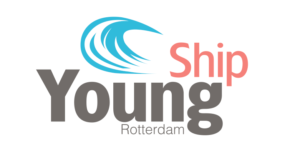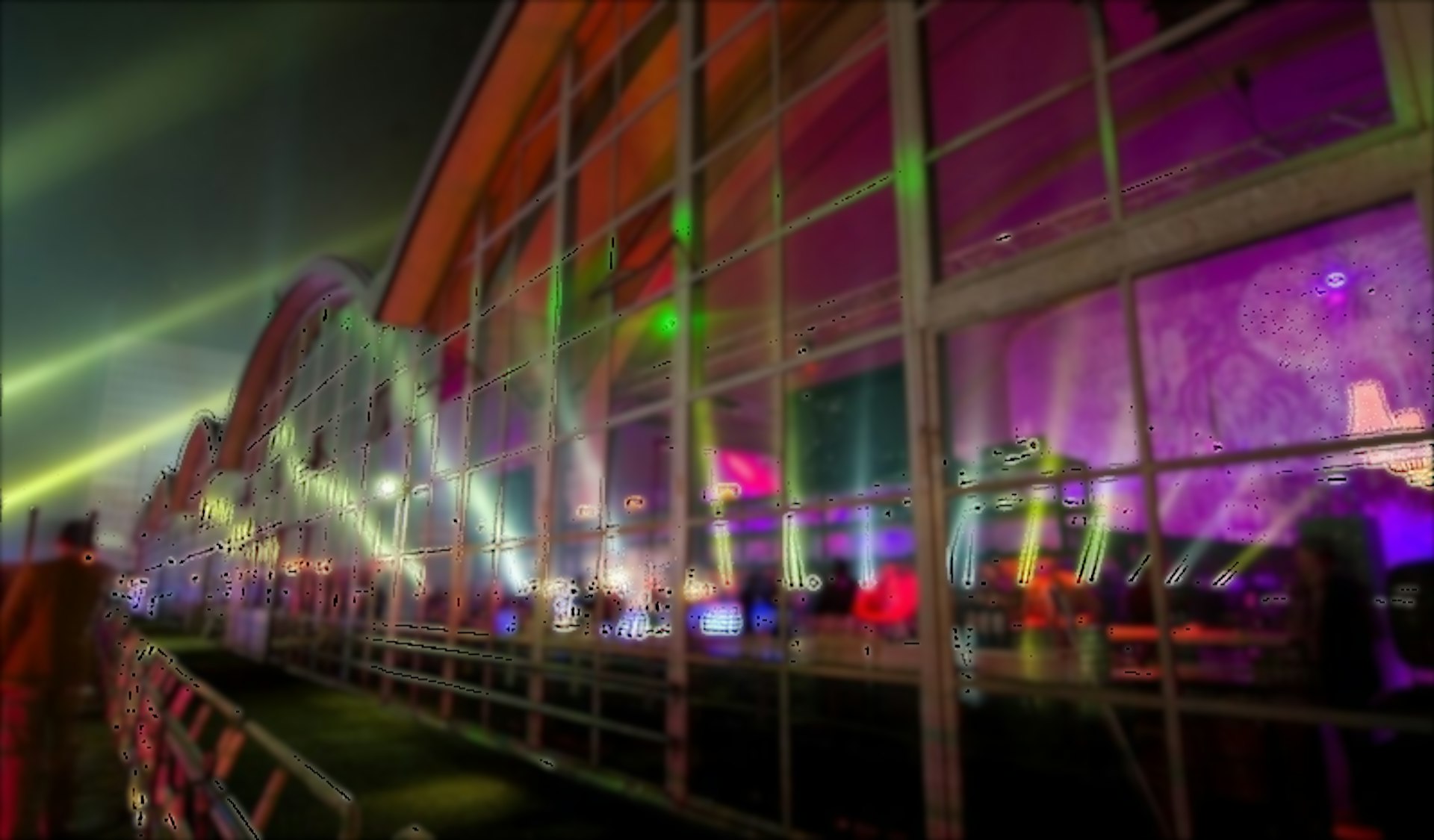
Experiment #2 - It's all about Gamification!
#RotterdamExperiment Quick linksGamification & building community against all odds
Thursday February 18th 2021 | Online, broadcasted live from Cruise Terminal Rotterdam
The world is in a rapid transformation that crosses cultures, industries and localities. Rotterdam is the capital of innovation; resilience is in our DNA. In The Rotterdam Experiment, Rotterdam Partners engages you during a dynamic series of collaborative experiments to explore the future of the events-industry, looking for future focused solutions. The second Rotterdam Experiment was all about Gamification and was broadcasted live from Cruise Terminal Rotterdam.
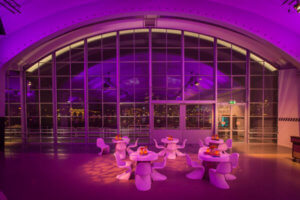
This 2nd Rotterdam Experiment will be brought to you live from Cruise Terminal Rotterdam
Introduction
Part of the required global societal shift which was touched on during the 1st Experiment is a shift from “me” to “we”. We believe that the events industry is well equipped to rise to this challenge as it is an international collective by nature, and collaborative by design. But the current challenge the events industry faces lies in the efficacy of that collaboration, when being physically present in a room has been impacted by social distancing measures and limitations.
Our Rotterdam Experiment ambassador, futurist Yuri van Geest, helped us put this challenge into perspective by drawing the parallel between the events industry’s shift from pure broadcasting to co-creation and the gaming industry’s shift to using serious games to address key global challenges, both by providing collaborative spaces. Further a valuable and fundamental insight for the future is that the values and competencies learned from gaming culture are now fundamental in work spaces and organisational cultures, including the event industry. Collaboration, curiosity, creativity, problem solving, persistence, grit. Learning and using these competencies are key for the transformation which still needs to come.
The 2nd Rotterdam Experiment, which was broadcasted live from Cruise Terminal Rotterdam, explored the world of gaming and how gamification elements provide both a framework and a culture for collaboration, while also building communities which cross borders and languages. We collaborated, using gamification elements and explored together and went looking for answers to the question: Does the world of gaming offer valuable insights on how to be an effective collaborative collective, to build community and resilience for the events industry?
A crucial question, because we are not just talking about creating better experiences for the delegates of events, but we are also talking about the survival of our industry by evolving to meet those needs. The 2nd edition of The Rotterdam Experiment featured panelists sharing the “why” and the “how” of gamifying events, with some of those learnings feeding into an ambitious brainstorm session. Why? Because every experiment and all innovation requires collaborative brainpower! Using the Total Brainbox method we dreamt up a possible future of events when gamification is part of that future, while also experiencing first-hand how gamification elements contribute to such efforts.
Our experts provided a multidisciplinary perspective on the reasons why gamification works, and offered best practices based on science and proven business practices. Via showcases of the gamified environment of Erasmus University in Minecraft, and a case study highlighting the evolution of the international Shipcon event we offered inspiration and challenged delegates of TRE#2 to think outside the box about what gamification means for the future of events.
Our own Rotterdam Partners Convention Bureau facilitated the conversation on topics like: how can I collaborate effectively at a distance, how can I ensure that I achieve meaningful engagement to achieve goals, how can I build community and develop membership when meeting face to face is restricted?
We heard from two innovators from Erasmus University Rotterdam, who dreamt of and built all four locations of the university campus in the Minecraft environment. The goal was to support the students and faculty whose intellectual home was off bounds due to the pandemic, by providing this community a virtual space in which they could bond with each other in a meaningful way, creating the foundation for successful learning in these trying times. A remarkable achievement establishing how the EUR is an innovative institution which embraces experimentation wholeheartedly, and which provided us with a deep dive into both the “why” and the “how” from a practical perspective.
We also spoke to a standard setting event organizer in the Netherlands, Odyssey, organizers of a highly successful live hackathon in the Netherlands, with 2000 delegates in 2019, and growing. We explored and were inspired by the process they followed to take the challenge of the world in lockdown and turn it into an opportunity, moving fully online and achieving a reach beyond their expectations via a custom platform which has now exceeded its original purpose and is transforming into a full-fledged enterprise software, currently being used by 10 universities, ministries, and international corporate giants to connect, collaborate and achieve results.
Finally, also from our own Erasmus University Rotterdam, we heard from a frontrunner in Persuasive Gaming, from whom we learned that many gamification elements are already known to us, but that the correct application of these is the missing link. She shared the academic perspective of how and why gamification elements are effective, and provide a roadmap to follow for event organizers seeking to gamify their events.
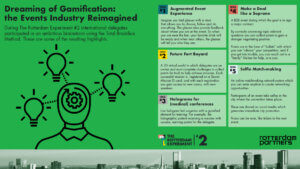
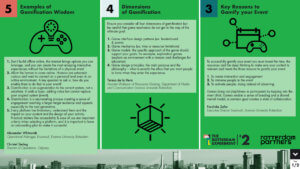 Learnings & Top Ideas
Learnings & Top Ideas
From this second Rotterdam Experiment we take away some very valuable and interesting learnings and during the Total BrainBox session participants came up with some really creative ideas on how to incorporate gamification elements in events of the present and events of the future. Click the infographics to view/download larger versions.
Recording & Aftermovie
Were you unable to attend? Did you maybe miss the opportunity to experience this Gamification experiment live yourself? Watch the full recording and a special aftermovie below!
Photos from the event
Experts
The following experts participated in this Rotterdam Experiment. Click 'Expert Bios +' below for information about these experts.
Catherine Kalamidas
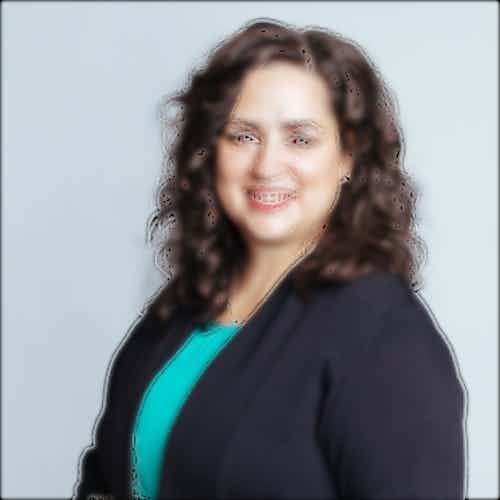
Teresa de la Hera
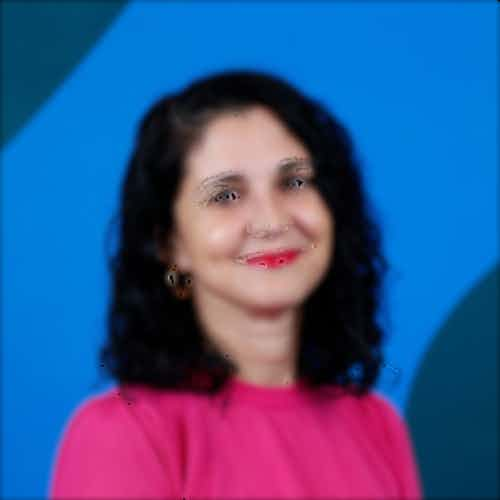
Farshida Zafar, L.L.M.

Alexander Whitcomb

Yuri van Geest
Coming from the interaction of technology, strategy, innovation, organization and digitization and focusing on technological, organizational and personal transformation/innovation, Yuri has helped hundreds of thousands of people globally to embrace exponential thinking and doing since 2008. In 2017, Yuri has been recognized by Thinkers 50 as one of the top 50 best emerging management book authors in the world.
As co-author of the highly acclaimed bestselling business book “Exponential Organizations”, Yuri impacted Prime Ministers, board rooms, creatives and change agents around the world at corporates, agencies, startups, governments, communities and purpose driven organizations. How? Via keynotes, workshops, training, digital transformation programs and executive coaching across the world.
Yuri is the initiator and founder of Singularity University the Netherlands, the first spinout in the world outside Silicon Valley. This spinout was opened by the Queen of Holland – Maxima. His work has been featured in the Wall Street Journal, CNBC, New York Times, Techcrunch, Forbes, Bloomberg and Fortune. Yuri earned a Master of Marketing, Business & Strategy (Rotterdam School of Business).
Catherine Kalamidas
Catherine Kalamidas joined the Rotterdam Partners CVB in 2016, and has since collaborated with Rotterdam’s triple helix of government, industry and academia to strategically acquire international congresses which align with the future ambitions of the city and its institutes. Her focus sectors include Life Science & Health, Agri-food, Digitalization & Sustainability. She has been active in the international events industry for more than 20 years, initially developing & organizing high level congresses in the maritime industry, and later serving as Director of Operations for an international PCO, leading the activities of the European Space Agency Conference Bureau. Catherine is on the Education Committee of the ICCA France Benelux Chapter and has recently joined the Meetings Industry Steering Group of European Cities Marketing. Catherine will be presenting and moderating this Rotterdam Experiment.
Teresa de la Hera
Teresa de la Hera is Assistant Professor of Persuasive Gaming at the Department of Media and Communication, at Erasmus University Rotterdam, where she is member of the Research Cluster Gaming Matters. Her expertise is focused on understanding how digital games are used as media for communication and tools for engagement, motivation, and persuasion. She is the author of “Digital Gaming and the Advertising Landscape” (2019) and main editor of the volume “Persuasive Gaming in Context” (2021), both published by Amsterdam University Press.
Farshida Zafar, L.L.M.
Farshida is Director ErasmusX, Erasmus University Rotterdam, Senior Fellow Jean Monnet Centre of Excellence for Digital Governance.
She has a track record in the field of educational innovation. In the past years she co-designed, developed and implemented both educational programs as well as new applications and platforms for educational purposes. Currently leading the ErasmusX initiative at Erasmus University Rotterdam, Farshidas ambition is to ‘future proof’ education.
The Jean Monnet Centre of Excellence for Digital Governance focusses on the impact of AI and Big Data on Law and Governance. Farshida is in the lead of creating open education themed around Digital Governance.
Alexander Whitcomb MSc.
Alex is Operational Manager for ErasmusX, Erasmus University Rotterdam. Alex has an education background in strategic management and has been active in the education industry for the majority of his career. After graduating from the Rotterdam School of Management, he went on to join the founding team of the Erasmus University College. Alex has occupied roles in Marketing and Recruitment for the university and more recently directs operations at ErasmusX. He is also the project leader for the Minecraft Virtual Campus of the Erasmus University Rotterdam.
Christel Sieling
As Director of Operations at Odyssey Christel Sieling headed the production of all editions of Europes largest Hackathon. The Odyssey Hackathon brought together 100 teams, 400+ experts, and 40 partners from all over the world, who collaborated to solve 21 complex challenges through mass collaboration.
As a result of the COVID-19 pandemic, Odyssey pivoted to host the 2020 edition of the Hackathon completely online. A completely new collaboration platform in 3D was developed: Momentum.
Christel graduated in International Relations from the University of Groningen, The Netherlands. Before joining Odyssey, she managed EU-funded innovation projects at the Municipality of Groningen and brought World Press Photo to Central-Asia for the first time in 20 years.
Anne Geelhoed
As vice chair of the maritime network organization YoungShip Rotterdam Anne Geelhoed is concerned with the organization of ShipCon 2021, an international conference for young maritime professionals. ShipCon is organized every two years by a different chapter of YoungShip International, and as the fastest growing chapter in recent years, the international board has granted Rotterdam with the honor for 2020/2021.
As a young professional in the maritime industry, Anne sees it as her humble duty to show other starting professionals that they can make a difference when it comes to innovating the industry. ShipCon can serve as a platform to reach out and share that message. Of course everything will have to be organised within the COVID-imposed reality and this is why it will be an online conference. Anne’s mission is to make this a meaningful, interactive but also fun conference for participants, YoungShip and Rotterdam.
Andries van Vugt
Andries van Vugt is a serial social entrepreneur and creative strategist for over 25 years. He is (co) owner of multiple companies that specialise in gamified learning and behaviour solutions. At the early dawn of the Internet, in the 90’s, he saw the possibilities to combine strategy, design and technology into powerful and fun solutions to upskill people. He has a strong social focus for helping children and adults to achieve their goals in life. His main company is Organiq, a Rotterdam based organisation, where he and a multidisciplinary team craft digital and blended gamified learning solutions often together with their office neighbours creative communicaton agency Boerenjongens. Before he took an interest in Internet and digital solutions Andries has been a musician and made a few records and CD’s with a formation called Misty Movement, one of the early adaptors of Dutch dance music and though it’s 20 years later the tracks are still sold worldwide and have a small fan base who uploaded them to YouTube. He also worked 5 years for Roland as an international Dance Gear demonstrator throughout Europe. About 6 years ago he attended a course in creative thinking in Dubai to learn about the method called Total Brain Box, an in- and out box set of tools to structure brainstorming and design thinking. Andries started to be an entrepreneur right after high school and is an autodidact using life as a continuous school. He is always on the look-out for innovation, social solutions and meeting the right people.
Coverage by The MICE Blog
The second Rotterdam Experiment was covered extensively by The MICE Blog, the online platform of Irina Graf, an international blogger who shares insights, knowledge and experiences with the global events community. On her website and through her social channels she has published about this experiment. Follow The MICE Blog on Facebook, Instagram, Twitter and YouTube.
Follow and share on social media (LinkedIn, Twitter): #RotterdamExperiment
















